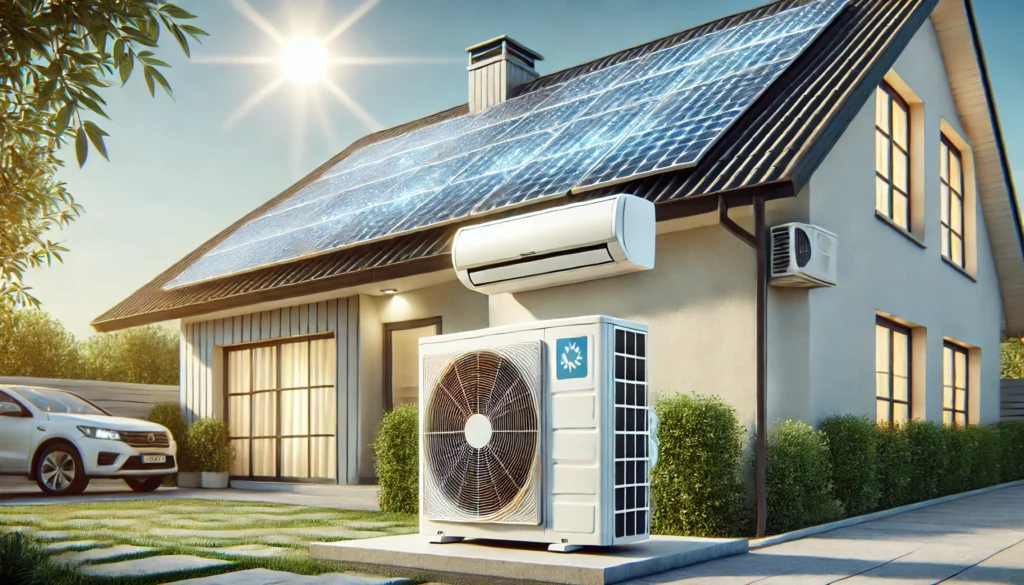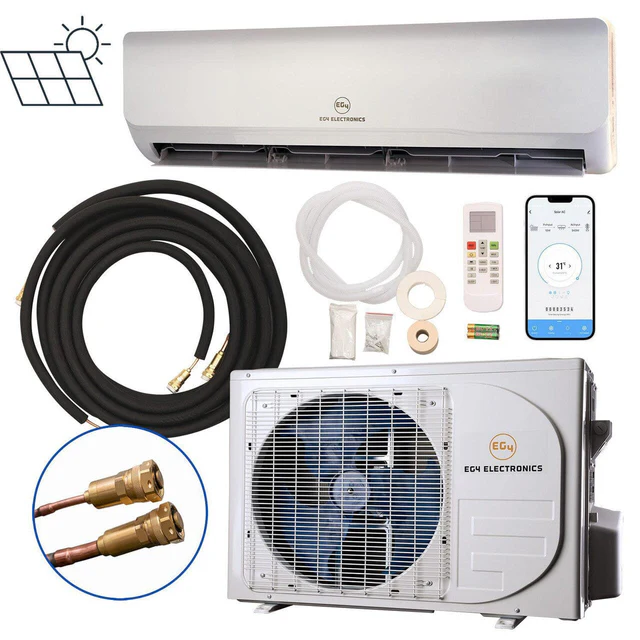Today’s society values energy conservation and eco-friendly solutions more than ever. As a result, solar-powered air conditioners have grown increasingly popular as solutions that reduce electricity bills while decreasing carbon footprints. In this article, we will examine some of the best solar panel air conditioners on the market and explore their many advantages for your home.
What Is a Solar-Powered Air Conditioner?

A solar-powered air conditioner is a cooling system that utilizes solar energy to power its compressor and other essential components like fans. These systems collect solar energy through panels, converting it into electricity to power the air conditioner. By doing so, they reduce reliance on traditional grid electricity, lower utility costs, and help create a cleaner environment.
Benefits of Solar-Powered Air Conditioners
Energy Efficiency
Solar-powered air conditioners use the sun’s free energy, reducing fossil fuel use and electricity costs while significantly lowering electricity bills.
Ecological Friendliness
By harnessing solar energy for cooling purposes, solar air conditioners reduce your carbon footprint significantly, making them an eco-friendly option.
Cost Savings
After the initial installation, solar-powered air conditioners can result in significant long-term savings—particularly in areas with abundant sunlight.
Reliability
Since solar air conditioners are independent of the grid, their reliability during power outages tends to be greater than traditional units.
Top 10 Solar Powered Air Conditioners
Gree Solar-Powered Air Conditioner
Gree’s solar-powered air conditioner is an energy-saving model made for both residential and commercial use. Featuring an intelligent inverter that adjusts energy consumption based on cooling demand, it boasts an impressive Seasonal Energy Efficiency Ratio (SEER) rating.
- Pros: Low energy consumption, reliable performance, easy installation
- Cons: Higher upfront cost
LG Solar Hybrid Air Conditioner
The LG solar hybrid air conditioner is known for its stylish design and advanced features. It combines both solar energy and grid power, offering excellent cooling without compromising efficiency. The inverter-controlled compressor optimizes performance and enhances energy efficiency, adapting to cooling demands for maximum savings.
- Pros: Hybrid system, energy-efficient operation, quiet performance
- Cons: Installation may require more room
Dakin Solar Air Conditioner
Dakin’s solar air conditioner is known for its energy efficiency, high cooling capacity, and long lifespan. Ideal for homeowners who want to reduce utility bills while maintaining a comfortable indoor environment, this system uses solar panels in addition to traditional electricity.
- Pros: Longevity, ease of maintenance, significant energy savings
- Cons: Expensive installation option
Senville Solar-Powered AC
Senville’s solar-powered air conditioner combines affordability with performance, making it perfect for smaller homes or apartments. It offers good energy efficiency at an economical cost.
- Pros: Affordable, compact design, suitable for smaller spaces
- Cons: Less powerful cooling compared to larger models
Toshiba Solar Air Conditioner
Toshiba is renowned for the quality and durability of its air conditioners. Their solar-powered unit combines cooling and heating functions, providing year-round comfort. Utilizing solar panels for power production, it operates with minimal reliance on grid electricity.
- Pros: Dual cooling and heating functions, energy-efficient, lower installation cost
- Cons: Not as powerful as other models
EG4 Hybrid Solar Mini-Split Air Conditioner
The EG4 Hybrid Solar Mini-Split Air Conditioner Heat Pump is a highly efficient and flexible climate control solution that combines solar energy with traditional AC/DC power. With a 12,000 BTU capacity and a SEER2 rating of 22, this system offers exceptional cooling and heating performance while ensuring energy savings. The Plug-N-Cool DIY installation makes it accessible for homeowners who prefer a simple, cost-effective setup without needing professional assistance. Whether you’re cooling in summer or heating in winter, this hybrid system delivers year-round comfort with a minimal environmental impact.
- Pros:
• Hybrid solar and AC/DC system for energy-efficient operation
• 12,000 BTU capacity with SEER2 22 for high efficiency
• Easy Plug-N-Cool DIY installation, saving installation costs
• Heating and cooling functions for year-round comfort
• Environmentally friendly, reducing carbon emissions - Cons:
• Requires space for solar panel installation
• DIY installation may be challenging for those unfamiliar with HVAC systems
• Initial investment may be higher compared to standard AC units
7. Trane Solar-Powered AC
Trane’s solar-powered air conditioning system is built for durability and energy efficiency. Using an advanced inverter, it optimizes performance according to cooling needs. Ideal for larger homes or commercial spaces, it provides long-term reliability with reduced maintenance costs.
- Pros: Versatile, energy-efficient, suitable for large areas
- Cons: Installation can be expensive
8. Samsung Solar-Powered Air Conditioner
Samsung’s solar-powered air conditioner combines cutting-edge technology with user-friendly features. With a powerful inverter and variable-speed compressor, this model ensures optimal solar utilization and provides efficient cooling.
- Pros: Attractive design, energy-saving features, powerful cooling
- Cons: Increased upfront cost
9. SolarAir Solar-Powered AC
SolarAir’s air conditioning unit is designed for off-grid homes, providing complete independence from electrical grids by operating solely on solar energy. It is perfect for rural or remote living situations.
- Pros: Off-grid capability, fully solar-powered, reliable
- Cons: Requires high-quality solar panels for optimal performance
10. Fujitsu Solar Hybrid AC
The Fujitsu solar hybrid air conditioner combines solar energy with grid power to achieve efficient cooling at reduced energy consumption. It’s a great option for homeowners seeking both comfort and sustainability.
- Pros: Hybrid system, quiet operation, energy efficiency
- Cons: Expensive installation
Factors to Consider When Selecting a Solar-Powered Air Conditioner
Energy Efficiency
Look for models with higher SEER ratings to maximize cooling while using less power.
Size of the Unit
Select a solar-powered air conditioner based on the area that requires cooling. Larger homes may require more powerful systems.
Installation Costs
While the long-term savings can be significant, consider the installation costs of both the air conditioner and the solar panels.
Climate
Areas that receive abundant sunshine will experience greater benefits from solar-powered systems than regions with more cloudy weather.
FAQ About Solar Powered Air Conditioners
1. How does a solar air conditioner operate?
Solar-powered air conditioners use solar panels to generate electricity, which is then used to power the cooling unit, reducing grid electricity usage and cutting down on costs.
2. Can I install a solar-powered air conditioner in any home?
Yes, but your home must have enough roof space and sunlight for solar panels to operate efficiently.
3. Are solar air conditioners as effective as traditional ones?
Yes, solar-powered air conditioners can be just as effective, and often more energy-efficient, due to their use of renewable energy.
4. How much can I save with a solar-powered air conditioner?
Savings depend on your location and energy usage. On average, homeowners can save between 30-50% on energy bills by using a solar air conditioner.
5. Do I need to install solar panels separately?
Yes, solar-powered air conditioners require solar panels to generate electricity. These panels are typically installed on the roof of your home.
Conclusion
Solar-powered air conditioners offer an innovative solution for sustainable cooling in your home. By harnessing the power of the sun, these systems help lower electricity bills while contributing to a greener planet. Whether you opt for a solar panel air conditioner or a hybrid model, the long-term benefits are clear. Consider factors like energy efficiency, size, and installation costs to choose the best option for your needs.

